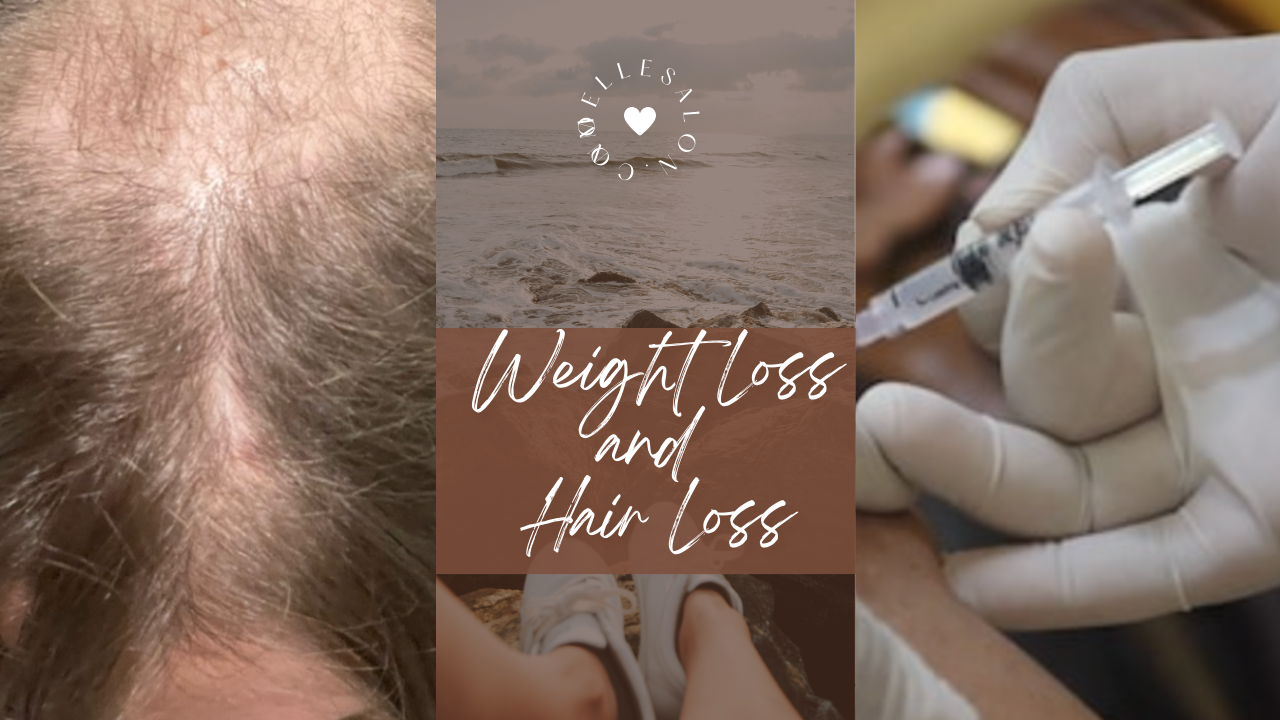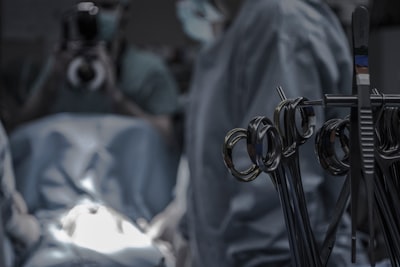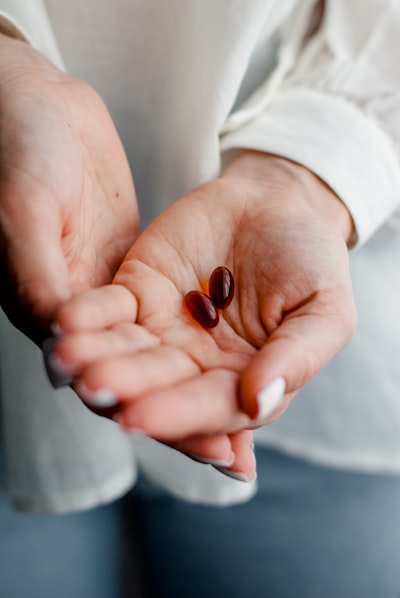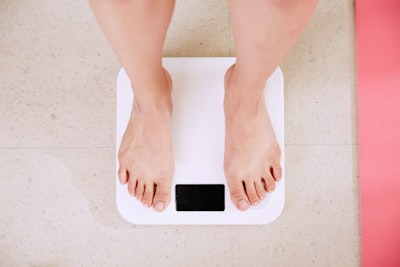Weight Loss and Hair Loss: What's the Link?
Losing weight is a common goal for many individuals, and it often involves making significant changes to diet and lifestyle. While weight loss can bring about positive health outcomes, it can also have unintended effects, including hair loss. Hair loss, medically known as alopecia, is a condition that affects millions of people worldwide and can be attributed to various factors. In this blog, we will explore the link between weight loss and hair loss and understand the common causes and potential solutions for this issue.
Understanding Hair Loss
Hair loss, or alopecia, is a condition characterized by the loss of hair from the scalp or other parts of the body. It can be temporary or permanent and can affect both men and women. There are different types of hair loss, including telogen effluvium, alopecia areata, and hair loss associated with autoimmune conditions.

Common Causes of Hair Loss
Hair loss can occur due to several factors, including medical conditions, nutrient deficiencies, and hormonal changes. Some of the common causes of hair loss include iron deficiency anemia, vitamin D deficiency, and zinc deficiency. When the body lacks these essential nutrients, hair growth can be affected, leading to hair thinning and loss.
Impact of Rapid Weight Loss on Hair Health
Rapid weight loss, often achieved through crash diets or restrictive eating plans, can also affect hair health. When the body sheds weight quickly, it may not receive enough nutrients, causing hair shedding and entering the telogen phase of the hair growth cycle. Additionally, drastic changes in diet and nutritional deficiencies can contribute to hair loss.
Role of Ozempic in Weight Loss and Hair Loss
Ozempic, a drug developed by Novo Nordisk, is an FDA-approved medication for weight loss and blood sugar control in individuals with type 2 diabetes. While Ozempic has shown effectiveness in weight loss, there have been reports of hair loss associated with its use.
How Ozempic Affects Body Weight
Ozempic works by stimulating the production of insulin and regulating blood sugar levels, leading to weight loss. The drug administration of Ozempic affects appetite and food intake, which, in turn, aids in weight reduction. As a result, individuals taking Ozempic may experience initial weight loss, which can have implications for hair health.
Potential Impact of Ozempic on Hair Health
Although the exact mechanism is not fully understood, some individuals using Ozempic have reported hair loss as a side effect. It is believed that the regulatory action of Ozempic on insulin levels may influence hair growth and hair shedding. Further research is needed to determine the precise relationship between Ozempic and hair health.
Weight Loss Surgery and Hair Loss: The Connection
Weight loss surgery, also known as bariatric surgery, is a surgical procedure that aims to help individuals lose weight by modifying the digestive system. While weight loss surgery can bring about significant weight loss, it may also have an impact on hair health.
Different Types of Weight Loss Surgeries
There are different types of weight loss surgeries, including gastric bypass surgery, laparoscopic surgery, and duodenal switch. Gastric bypass surgery involves reducing the size of the stomach and rerouting the small intestine, resulting in decreased food intake and absorption. Laparoscopic surgery, another common approach, involves performing small cuts instead of open surgery, minimizing recovery time and scarring.
Post-Surgery Hair Loss: Why Does it Happen?
Hair loss after weight loss surgery can occur due to several factors. Rapid weight loss, general anesthesia used during the procedure, and nutritional deficiencies are potential contributors to hair shedding. The physical stress caused by surgery and the body's adjustment to new nutritional needs can also lead to hair loss.
Role of Diet in Hair Health As the saying goes, "You are what you eat." Your diet plays a significant role not only in weight management but also in hair health. A balanced diet that includes essential nutrients supports overall hair health and growth.
Key Nutrients for Hair Health
Several nutrients are essential for hair health, and deficiencies in these nutrients can lead to hair loss. Iron deficiency, for example, can result in iron deficiency anemia and affect hair growth. Vitamin D and zinc also play important roles in hair growth and protein synthesis, respectively.
Balancing Weight Loss and Hair Health
While weight loss is desirable for many individuals, rapid weight loss and crash diets can lead to hair shedding and nutrient deficiencies. Balancing weight loss with a nutrient-rich diet is important for maintaining hair health. Extreme calorie restrictions should be avoided to support healthy hair growth during weight loss.
Importance of Micronutrients in Hair Health
Micronutrients, such as iron and vitamin D, are crucial for overall hair health. Iron deficiency can lead to a type of hair loss known as telogen effluvium, while low vitamin D levels are associated with hair loss and alopecia areata.
Role of Iron in Hair Health
Iron deficiency plays a significant role in hair loss and hair thinning. Iron is an essential nutrient for hair growth, and deficiency can disrupt the hair growth cycle. Addressing iron deficiency anemia through supplementation or dietary changes can help improve hair health and growth.
Vitamin D and Hair Loss
Low vitamin D levels have been linked to hair loss and alopecia areata, an autoimmune condition. Vitamin D is thought to play a role in hair follicle function and hair growth. Adequate vitamin D levels, obtained through sun exposure and dietary sources, are important for maintaining healthy hair.
Zinc's Influence on Hair Growth
Zinc deficiency can also affect hair growth and lead to hair loss. Zinc stimulates protein synthesis and plays an important role in immune function. Including zinc-rich foods in the diet, such as nuts and seeds, supports overall hair health and growth.
The Effect of Protein and Calorie Restriction on Hair Loss
Protein and calorie restriction can have an impact on hair loss during weight loss. Protein is essential for hair structure, and inadequate protein intake can lead to hair thinning and loss over time. Drastic calorie restriction can disrupt the hair growth cycle and deprive hair follicles of essential nutrients and energy.
Understanding Protein's Role in Hair Health
Protein, specifically amino acids, is vital for hair growth and strength. Amino acids are the building blocks of proteins and are essential for hair growth and repair. Diets low in protein can result in hair loss and should be balanced with adequate protein intake to support healthy hair growth.
Impact of Calorie Restriction on Hair Growth
Severe calorie restriction can negatively impact hair growth by reducing energy availability and nutrient intake. When the body does not receive enough calories, it prioritizes essential functions over hair growth. Balancing calorie restriction with nutrient-dense foods ensures that hair follicles receive adequate nourishment and promotes healthy hair growth.
Supplements to Support Hair Health During Weight Loss
In addition to a balanced diet, dietary supplements can provide extra support for hair health during weight loss. Certain supplements have been associated with improved hair growth and maintenance.
Essential Supplements for Hair Health
Several dietary supplements are essential for hair health, such as biotin, iron, vitamin D, and omega-3 fatty acids. Biotin, also known as vitamin B7, supports hair growth and overall health. Iron transports oxygen and nutrients to the hair follicles, while vitamin D promotes hair growth and reduces inflammation. Omega-3 fatty acids help reduce inflammation, which can contribute to hair loss.
Choosing the Right Supplement
When choosing supplements to support hair health during weight loss, it is important to consider the ingredients and efficacy of the product. Look for supplements that promote overall health and support weight loss goals. Read reviews and consult with a healthcare professional before starting any new supplements to ensure safety and effectiveness.
Can Hair Loss Due to Weight Loss be Reversed?
In some cases, hair loss due to weight loss can be reversed. Maintaining a balanced diet and ensuring adequate nutrient intake are important steps in supporting hair regrowth. Adding supplements, such as biotin and iron, may also aid in hair loss reversal. If you are experiencing excessive hair loss or have concerns about your diet, it is recommended to consult with a healthcare professional for personalized advice and guidance.
Conclusion
In conclusion, understanding the link between weight loss and hair loss is crucial for anyone embarking on a weight loss journey. Rapid weight loss can hurt hair health, leading to increased shedding and thinning. However, there are ways to mitigate these effects. Ozempic, a weight loss medication, has shown promising results in both weight loss and potentially improving hair health. Additionally, maintaining a balanced diet rich in key nutrients such as iron, vitamin D, and zinc can support hair health during weight loss. It's important to note that while hair loss due to weight loss may be concerning, it can often be reversed with proper care and attention. If you're experiencing hair loss during your weight loss journey, consult with a healthcare professional or a trichologist for personalized advice.








